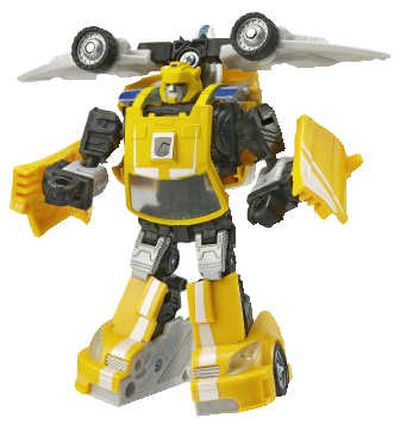Hasbro transforms to cash in on movies

PROVIDENCE, R.I. – Like one of its own Transformer robots, Hasbro Inc. has spent the past few years trying to change itself from simply a toy company to a business that creates the ideas behind movies, TV shows and electronic games.
When the Pawtucket, R.I.-based company reports its third-quarter earnings Monday, investors hope to see the early payoff from the strategy. Analysts surveyed by Thomson Financial expect net income to rise nearly 18 percent from this time last year, to $117.5 million, and earnings of 71 cents a share.
Part of what’s driving those expectations is the two-decade-old Transformers toy line. “Transformers” the movie was released in the United States on July 3, just after the quarter began, and has helped make Transformers products among the most sought-after toys for the holiday season.
The movie was the first step in what Hasbro hopes to be a long and fruitful relationship with Hollywood: Hasbro supplies the characters and story lines from its toys – household names such as G.I. Joe and Monopoly. Hollywood turns the ideas into big-budget movies or successful TV shows. Then Hasbro reaps the benefits. A Transformers animated TV show is coming in the spring, and Hasbro is planning a Transformers sequel, a G.I. Joe movie and at least one TV game show.
Hasbro, the world’s second-largest toy maker behind Mattel Inc., has made movie-related toys for years, but it didn’t own some of the most popular brands, such as Spider-Man, and had to pay royalties. A few years ago, it struggled with an overreliance on fads, including Furby, and movie-related toys and was forced to cut hundreds of jobs as it lost $144 million.
These days, the company’s strategy is to look at the time-tested brands it already owns – Trivial Pursuit, Battleship, Littlest Pet Shop and Mr. Potato Head, for example – and turn those into new products like movies, TV shows, games or online experiences, said Brian Goldner, Hasbro’s chief operating officer.
“Our goal is to create that immersive experience that allows consumers to enjoy our brand anywhere – in any format they want – when they want,” Goldner said.
Hasbro has had several good quarters and investors responded by driving Hasbro’s share price up 56 percent in the past two years, from about $19 a share in mid-October 2005, to a close of $29.25 on Thursday.
Still, in a note to investors earlier this month, Gerrick L. Johnson, of BMO Capital Markets Corp., cautioned that the entire toy industry could see fallout from a slowing economy and concerns about toy safety. While Hasbro hasn’t been involved in the most high-profile toy recalls this year for lead paint, Johnson wrote that sluggish sales could cause retailers to put off buying any more toys in the quarter.
The Transformers movie has made about $700 million worldwide since it was released this summer and about $316 million domestically. Hasbro does not share significantly in the box office – something Goldner says it agreed to forgo because it didn’t invest in the movie’s production cost.
But it shares in the success in other ways. It made money by licensing about 230 Transformers products, including cell phone games, video games and a jacket that transforms to a backpack and a pillow and sells for about $500.